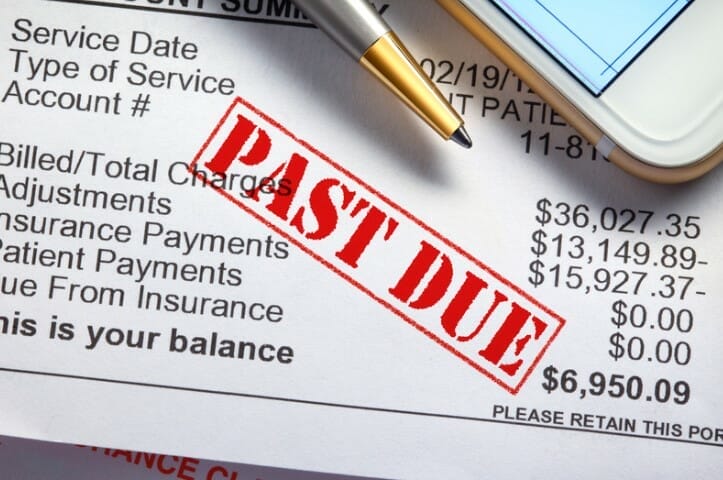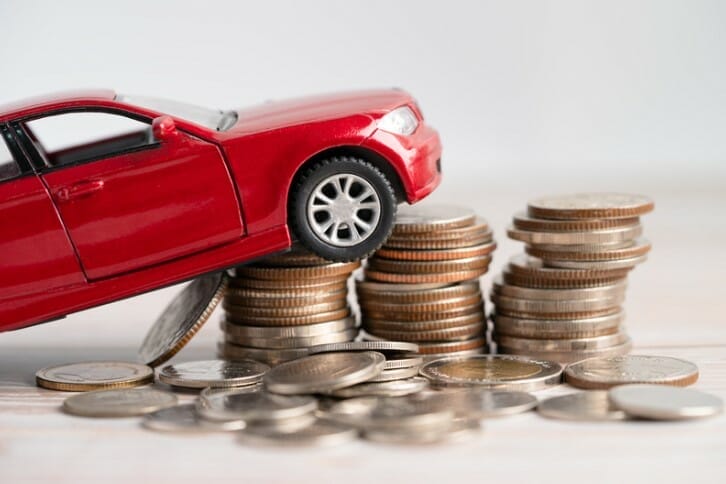There are plenty of disadvantages of debt, but more importantly, you need to fully understand the different types of debt to get the full picture. I’ll cover both topics.
Unfortunately, debt is one of those things that is just a part of life. No matter how good of a job you have or how well you do at budgeting, there is a good chance that you’re going to have some debt on your hands, especially early in your life.
The one thing I will always preach is that you can’t create money unless you are willing to spend it. And while there are plenty of disadvantages of debt and long-term financing, it’s also not a horrible thing as long as you buy things that don’t depreciate quickly.
The bottom line is that there are going to be very few people in this world that won’t have to finance the debt of some kind. And if you are so fortunate to be one of those people, I thank you for taking the time to read this.
So, let’s start from the beginning here; what is debt? This is a bit of a softball, but debt is defined clearly as money owed by one party to another. And while the definition of “debt” is simple, it can get complicated quickly depending on the type of debt that you have.
As mentioned above and I’ll say it again before this piece is finished, some debt is not bad. But the wrong type of debt and too much debt can be a burden on your life very quickly. As we continue to discuss the advantages and disadvantages of debt, let’s start with the different types of debt.

Forms of Debt:
Secured Debt – One of the most common types of debt that you will see is what we call secured debt. All this means is that the borrower has put up collateral against the loan. In the example of a car loan or mortgage, the assets you are buying are considered collateral. If you don’t pay the loan, they can collect the items as repayment.
That is why 20 percent down is normal to get the best interest rate on a home. Should a bank need to repossess a home, there is very limited risk for them if they have the 20 percent upfront.
So, what are the disadvantages of debt when it comes to “secured debt”? The obvious is the loss of assets. If for whatever reason you are unable to repay the loan, the bank could collect the asset to be made whole.
That means if it’s your house you live in with your family, or the car that gets you to and from work each day, you could be in a very difficult position without that asset. The other major disadvantage is the damage it could do to your credit.
Obviously, if you aren’t paying on your loans, you have bigger concerns than a blow to your credit score, but remember, with damaged credit, it is almost impossible to buy anything. Once you have a red flag on your credit history, finding someone to give you a loan at a reasonable interest rate becomes more and more challenging.
Of all the debt types we will evaluate today, secured debt is by far the best. The advantages of secured debt include low-interest rates, larger loan amounts, and the ability to build your credit with on-time payments.
Things have certainly been changing as we go through a period of high inflation, but just a year ago, I was able to refinance my home for a 20 year mortgage and received an interest rate of two percent. With standard inflation over three percent, that is basically like giving out free money.
I know the Dave Ramsey motto is to never have debt, but when you can get an interest rate that low, there is nothing wrong with some secured debt.
Unsecured Debt – The next item to discuss today when looking at the disadvantages of debt is unsecured debt. While secured debt is the most favorable debt to have, one would argue that unsecured debt is the most common for folks to have.
What is unsecured debt? This is a loan that is not backed by an asset. Now, that doesn’t mean if you don’t pay an unsecured debt you won’t lose anything. The most common type of unsecured debt is credit card debt.
Should you decide to stop making payments or rack up more than you can pay, you will then be sent to a debt collector. Once you decide to not pay the debt collector, you will either get sued for payment (which could end up including your personal assets), or you could end up with wage garnishment.
So, the disadvantages of debt when it comes to unsecured loans aren’t as clear, but the repercussions can be equally as harmful. For one, eligibility for an unsecured loan can be much more difficult to secure. With the incremental risk, the more stringent the requirements.
With increased risk, the next two items will not be shocking. Loan amounts will be smaller and interest rates will be higher. The lender wants to at least make something on their money, especially if you default and they must pay a debt collector to be made whole.
This doesn’t mean that unsecured debt is a bad thing, but it must be managed properly and be used in the short-term (unsecured loans can be no longer than five years). With an unsecured loan, the good news is they are quickly processed (if you are approved).
There are also very few limitations on how the money is spent. While it’s important that the money be paid back, the lender doesn’t care what you spend it on (as long as it is legal). Remember, if you don’t pay, you could be sued or have wages garnished, but the lender can’t come after any type of collateral. This does save you from losing a house, car, or something extremely valuable.
Now that we have covered the two different forms of debt and how they can be beneficial and harmful to you at the same time, let’s break it down even further. There are several different types of debt that fit into one of the two “forms” listed above. Let’s dive deeper into the advantages and disadvantages of debt for each type.

Types of Debt:
Medical Debt – The first type of debt I want to discuss is medical debt. This is any amount of money you owe to a medical doctor or medical facility. This can be for routine checkups or something more serious like surgery, a broken bone, or hospitalization.
Medical debt would fall under the form of unsecured debt because there is no collateral, but you can get sent to collections for past due bills.
Medical bills are tough because often they go through insurance so you may not even get a bill for a few months. It’s easy to forget about things and then by the time you receive the bill it is a bit of a shock or surprise to you.
The main disadvantage of debt when it comes to medical bills is the burden of the payment plan, or the interest charged if you try and move it over to a credit card. Medical expenses are one of those things that you can’t necessarily go without, but do your best to understand your insurance to try and limit expenses as much as possible.
Hospitals and medical facilities are typically really good about payment plans with zero percent interest which can be extremely beneficial for someone working within a tight budget.
Student Loan Debt – Another type of debt that is a form of an unsecured loan is student loan debt. That means any amount of money you took out to pay for your further education.
This one is tough to call as necessary as medical bills, but certainly, the trend has changed to a majority of the population at least attempting to go to college. The cost can be astronomical depending on the university of your choice and can hold long-term consequences if you aren’t careful.
When talking about the disadvantages of debt with student loans, the biggest burden is simply calculating the return on your investment. And not to be harsh, but some folks struggle with that. If you are going to spend $250,000 for an education that pays $35,000 a year, it’s going to be extremely difficult to pay off that debt without some struggles.
I have two pieces of advice that helped me get through these struggles with student loan debt. First (which can be tough to hear), don’t bite off more than you can chew. I went to a community college for two years and then transferred to save as much money as possible. I still have a degree with a major university name and saved $30,000 over those two years. I had parents who were helping, but I didn’t want to rack up debt that would last for 20 years.
Second and most importantly, don’t borrow “fun” money with student loans. I have had friends that took out more than they needed so they can live life, and that is a dangerous road. You obviously need the essentials to survive but borrowing extra money to party and have fun can be costly down the road.
Credit Card Debt – The first two types of debt I covered above are difficult to avoid and fall under the category of “necessary debt”. I just made that term up, but you get what I mean. There is nothing wrong with wanting to go to college and not having the money saved to pay for it, and you certainly can’t help from having an injury or medical need that requires attention.
The next type of debt that also falls under unsecured debt is the most detrimental of them all: credit card debt. This is the most common form of debt that you will see. Credit cards are far too convenient to use, and if you aren’t careful and diligent, it’s easy for spending to spiral out of control.
Because it is unsecured, the interest rates on most credit cards are north of 20 percent. That means when you miss a payment or only pay the minimum, the interest can add up quickly and put your future at risk.
Disadvantages of debt from a credit card can include being forced to file bankruptcy, damaging your credit score which can limit you for years, and the inability to have access to credit in a true emergency. If you choose to utilize the perks of a credit card, please be sure you can afford the payment each month. Credit card debt can be nasty, and I have seen it destroy people and families.

Car Loans and Mortgages – The last type of debt I want to talk about today is car loans and mortgages, which are both secured debts. Anytime there is an asset that can be collected on default, you will be able to borrow money over a longer period of time, and you will receive a better interest rate.
Both of these items are also considered necessary in my book, as you need to have a means of transportation and a place to live. The list is even longer on why owning your house vs. renting is positive, so having some secured debt for a mortgage should not be viewed as negative.
A car is one of those things that is a luxury. I know when I was 25 years old, I liked to have an expensive car that I really couldn’t afford, but I lived and learned and now have no car payments. Having a car loan is not a bad thing, just make sure to keep it to a 60 month loan. If you have to extend it longer than that, you likely can’t afford it and are paying too much for an asset that depreciates.
We hit the disadvantages of debt from secured loans earlier in the piece, but it’s worth mentioning again. The asset with the lean is at risk if you don’t pay, and once again you can severely damage your credit by not making payments. If anyone out there leaves reading this article wondering how important a credit score is, please continue to dig in and do some additional research.
The bottom line is that the disadvantages of debt can be severe. Not only can it cost you personal property if not paid in a timely manner, but you could also be sued for repayment which could lead to wage garnishment.
As with anything, if you properly utilize debt and make timely payments, there can be some real benefits as well. It will allow you access to large amounts of money with not a ton of costs, but you must know how to manage it.
Related posts:
- Understanding all the Disadvantages of Loans and the Problems they can Bring In today’s world, it is easy to go to a bank and get money, however, you should understand the disadvantages of loans before overextending yourself....
- A Deeper Look at all of the Credit Card Pros and Cons that Exist We now live in a world where most people solely use credit cards, cash is a blast from the past. Check out these credit card...
- Looking at all of the Advantages of a Personal Loan There are all types of loans available to you, but one some don’t think about is a personal loan. There are a lot of advantages...
- Credit Cards? Pshh. Let’s Break Down the Debit Card Advantages and Disadvantages In the personal finance community, there are many varying opinions on all topics imaginable. And as you might anticipate, some of them can get pretty...
